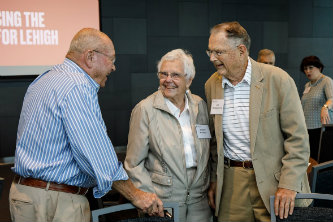Lehigh’s Own Startup: the College of Health

Patrick Farrell, provost and vice president of academic affairs, shared the vision of the new College of Health with members of the Tower Society at the annual breakfast meeting on Sept. 8 in Iacocca Hall’s Wood Dining Room.
In the true entrepreneurial spirit of Lehigh University, alumni and friends attending the Tower Society Breakfast on Sept. 8 learned of the university’s own startup initiative on the horizon—the College of Health—from Patrick Farrell, provost and vice president of academic affairs.
Tower Society Chairman Mike Caruso ’67 led the annual meeting in Iacocca Hall that included expressing appreciation to Tower Society members for all they do to make the student experience what it is today. He also posthumously awarded Wouter de Nie ’68 the James Ward Packard Award for his contribution to Lehigh’s planned giving program and his extensive impact on his alma mater that included championing campus beautification.
Nearly 150 alumni and guests listened intently as Farrell spoke about the addition of a fifth college that will not be a traditional medical school, but will draw upon the existing strengths of the university in addition to new intellectual areas to contribute to value-based health care and biological and social determinants of health. Curriculum focus would include the effectiveness, accuracy, and efficiency of health care delivery from the medical industry to patient, as well as the impact and outcome of that care. Plus, examining major influencers of health such as genetics, economics, environmental factors, and life choices like smoking would fall within the scope.
The new college would add approximately 500 undergraduate students; 200 graduate students; and 50 faculty members, some with joint appointments in other colleges.
“It is a fascinating concept, and certainly everybody should have an interest in it—for our health and the health of society in general,” said David Walker ’57 ’82P ’87P ’15GP ’21GP. “It sounds like a real challenge, and I hope it is very successful.”
Students in the College of Health and in other Lehigh academic colleges will cross each other’s learning paths to create new intellectual activity. The core of the new college will center on traditional classroom programs, research, experiential learning, and student-faculty interdisciplinary collaboration that examines growing key areas of need in health care. Data analytics, health communications, systems perspectives on health care delivery, community health, biostatistics and ethics are just the tip of what is being considered to provide answers to well-being and health care system operations.
Farrell said this vanguard field will help develop the talent and skills of Lehigh students to be future leaders in the evolving health care industry in areas that are not even foreseen. He shared that this direction of education will be the model for others to follow. The College of Health will leverage Lehigh’s strengths to help ensure its faculty and graduates working in health and health-related fields will be leaders in a complex and rapidly growing industry.
“We want to develop undergraduate and graduate students who have an area of expertise in health but also have a broad and not very parochial view,” said Farrell. “Our Lehigh graduates have expertise in the area of their major, but almost all of them have branched out and said, ‘I need to know more about THAT field in order to really contribute to the field I want to contribute to.’ Our students do that all the time. Our faculty encourage that. That’s the kind of thinking I think we need for the health care of the future.”
The Lehigh discussion for the College of Health has been in the making for at least 10 years. The current time line anticipates a dean on board by spring 2019 who can build a strong curriculum and research-based program. Class offerings with dedicated faculty will begin in fall 2020. A facility to replace the Whitaker parking lot is in the design stage and is planned to open by fall 2021. The open-concept building will be suited for the free flow of people, ideas, and cross-collaboration.
“I think it is an interesting way to continue what I call the integration across the various colleges. We heard Pat talk a lot about how it was going to tie into things we were already doing, but just expanding it into perhaps a new and very important direction,” said Eric Flicker ’71 ’71G. “I think it will have an impact on raising the stature of the university, even beyond where it is today.”
Questions asked to the provost included if the university plans to partner with outside organizations. Since Lehigh does not have on-site clinical access, long-term partnerships are being considered locally and beyond that can provide the facilities, medical acumen, and professional resources needed to extend the reach of the program.
With the possibilities that the College of Health may offer, Patricia Rogowski ’84 said that a distinction needs to be made with the branding and public education of the new dedicated health field at Lehigh.
“I think the first impression is that the College of Health is a medical school,” said Rogowski. “This is not a medical school. This is something better than that.”
Story by Dawn Thren ’21P
Photos by John Kish IV
Posted on:






